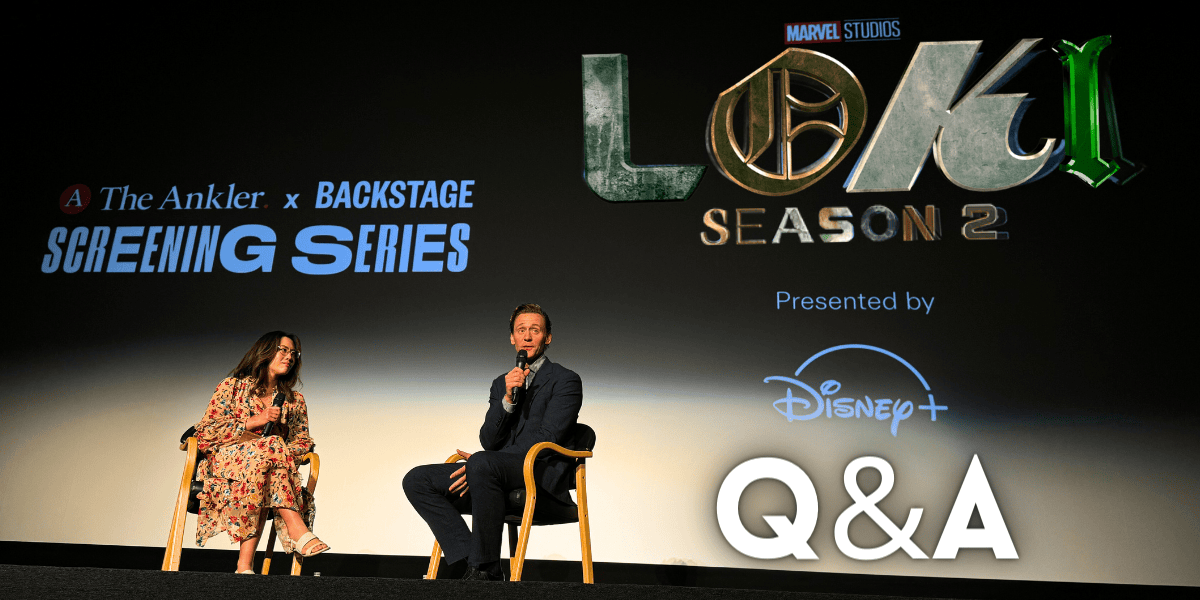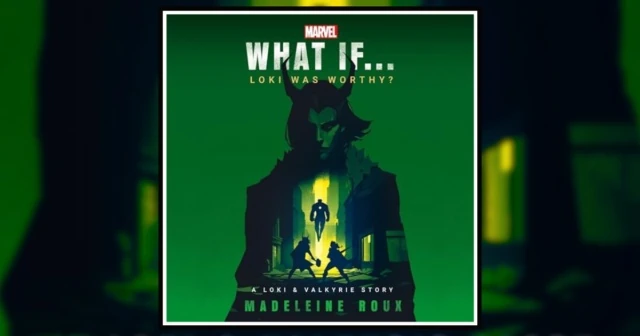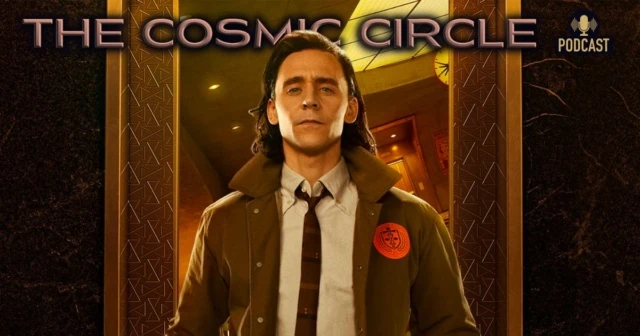As the 2024 television awards season kicks off in Los Angeles, Loki season 2 appears to be a strong contender. On Friday April 12th, I attended an exclusive screening and Q&A event with Tom Hiddleston, hosted by The Ankler and Backstage.
Held at the Harmony Gold Theater in downtown L.A., attendees watched the final two episodes of the season on the big screen. Afterwards, we were treated to a 30-minute Q&A session with Hiddleston, the lead star and executive producer of Loki.
[Editor’s note: quotes have been edited slightly for clarity.]
Tom Hiddleston reflects on the road to the Loki series
Experiencing the events of “Glorious Purpose”, the season (or perhaps series?) finale of Loki, in theaters (!) was breathtaking. I wish all the MCU Disney+ series received limited theatrical releases. It’s a shame only a few people get to see these episodes in a theater.
While the screening was pretty special, Tom Hiddleston’s Q&A was the main attraction. Questions weren’t taken from the audience, but moderator Elaine Low clearly did her research and knew exactly what to ask him!
Of course, she had to know how many times Hiddleston expected to close the door on playing Loki. “There were two, I think. One was making Thor: The Dark World. In the original script, in the realm of Svartalfheim, the home of the Dark Elves, Thor is losing a fight with the character called Algrim or Kurse, who is a very powerful Dark Elf. And Loki joins the fray and sacrifices himself to save his brother. Both Chris Hemsworth and I played it for real because we thought it was real. It was only when Marvel Studios did some test screenings of the film […] to the question ‘Is there anything you found [particularly] confusing’, everybody said, ‘Surely Loki’s not actually dead.’ Basically, they thought, ‘Well, let’s rethink this’, and so we redrafted the ending – which is thrilling – and then I got to stick around.”
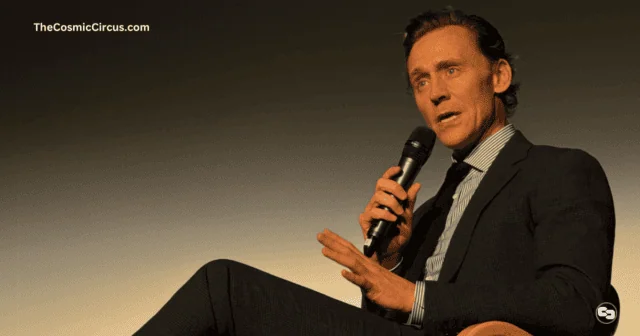
“The second time was Avengers: Infinity War. In the first scene of that film, Loki, in an attempt to distract Thanos from torturing Thor, his brother, he tries to talk his way out of it, but ultimately, truly gives his life to save his brother. It felt tragic and redemptive, and really did feel final at the time. And then a year later, Avengers: Endgame, the Avengers time traveled back to 2012. When Loki is arrested at Stark Tower and Loki picks up the Tesseract. There’s a distraction, I think because the Hulk has to take the stairs, and then Tony Stark has a heart attack, and Robert Redford is very confused. In the melee, Loki picks up the Tesseract, disappears in a puff of smoke. That was the starting point for the Loki series on Disney+. Whereupon, as I’m sure you’re aware, he is apprehended and arrested by agents of the TVA, the organization that orders the unfolding of reality, and he’s tried for crimes against the timeline – taken literally out of time. And there begins a second chance.”
Next, the moderator wanted to dive into how different Loki is from the rest of the MCU, saying “Let’s talk about Loki, the show. Thematically very different from the tone of the Avengers movies, Loki is absurdist and surreal and retrofuturistic. How do you adapt that character in the way that we’ve seen him previously in the big blockbuster movies to [an] almost claustrophobic kind of set?”
Tom Hiddleston responded: “Initially, the great thrill of the pitch was that if the TVA as a bureaucratic institution represents order, Loki would represent chaos, and out of that conflict will arise the drama. Something I was extremely excited by in the first season was to strip Loki of everything that was familiar to him, literally, of his clothes, of his brother, of his father, of his home, of his status, of his name, he’s given a number, he’s a variant, variant… [L1130]. This elevated high status character is reduced to a number, and his colorful and eventful life full of feeling and emotion is a file on a shelf, in a drawer in an archive. In any story, to have a character watch a highlight reel of their life – in Loki’s case, a catalog of mistakes, missteps, and failures in relationships – would create a kind of existential shock and despair and challenge even the hardest of hearts and the most fundamentalist of mindsets to change.”
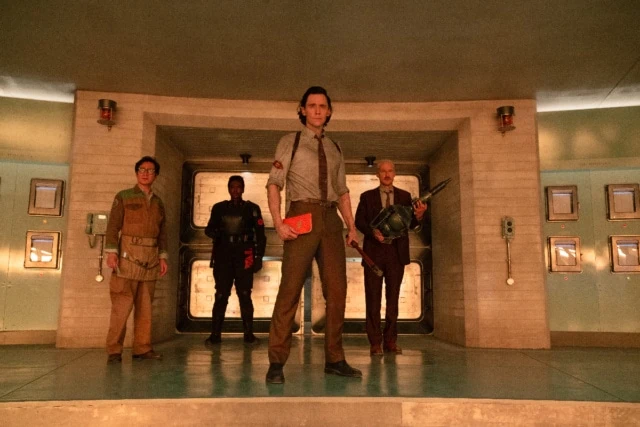
“And so the whole theme of our show became about identity. Who are we really? Can we change? Are we in control of our own destiny? Do we have free will? Is reality simply unfolding according to some predetermined diktat? And who gets to write that? Who’s in control? And then actually, in order to be the best version of ourselves, we have to make peace with the past, we have to own up to our mistakes, we have to accept our failures and acknowledge our shadow. Only then do you have the capacity to change, to redefine the location of meaning in your life, for Loki to redefine his glorious purpose. That became the theme of the show, and that extends across every character as well. You can almost write a sort of a thesis on identity as it relates to Mobius, as it relates to Sylvie, as it relates to B-15. Who are we really? Who are any of us? Are we the masters of our own fate? Are we the captains of our own soul? And I hope that the conclusion of Season 2 is that through that confrontation, Loki’s desperation and drive to find a new meaning and new purpose, he has found a place to belong, and he has healed his broken heart and given his life meaning.
Glorious purpose as a theme of the series
The phrase “glorious purpose” has taken on a very new meaning after the conclusion of Loki season 2, and it’s something the moderator wanted to dig into. Low mentioned how Loki has become a character who now values his connections and community rather than being the isolated character he was in the beginning.
Tom Hiddleston expanded on that by saying, “I think you’ve hit upon something that I’ve been thinking about for 15 years. I was so grateful. When we made the first Thor movie, to have been given a narrative arc by the late, great, Don Payne who wrote the screenplay, which was filled with such pathos. Loki’s origin story is one of enormous pain and heartbreak. In that film, he discovers he doesn’t belong in Asgard. That he was adopted, and that he was an orphan, and he was left to die on a frozen rock. And he feels on the margins immediately. This isn’t my family, this isn’t my home. That heart, that grief is what then hardens into grievance, which becomes the engine of his villainy in Avengers. It’s that feeling of not belonging, not having a community. I think the journey in Loki as a series is that he finds a community, he finds friends. I think his relationships with Mobius and Sylvie take on a shape that he wouldn’t have recognized before. These are real relationships where he really cares. It’s extraordinary for a character of such elevation, in a way, that the center of him is remarkably human. He just wants his friends back.”
When asked about his creative involvement as an executive producer on Loki (one of the few Marvel actors to hold that title on their projects), it was quite clear how protective Hiddleston has become over Loki as a character.
“I have loved being an executive producer. The title for me represents, practically, a place at the table in the development of the story, in the development of the narrative and the tone, the kind of imaginative space we’re occupying as creatives. I was really passionate about creating a show that had conviction and sincerity and vulnerability that leaned into these philosophical questions about fate and free will, that was able to be entertaining and had a propulsive momentum but felt like it was about something. I encouraged everybody, if I had any power to persuade them, to lean into the sincerity of those questions. That’s where Loki works best, is when he’s driven by very profound forces that feel very human. I was able to be in the writers room on both seasons. The first season was led by Michael Waldron, and the second season was led by Eric Martin. Those are such unique opportunities for us, certainly for me because there’s time to dream. There’s time to free associate and talk about, write something on a whiteboard, and discuss it. I do remember one morning coming in, I just wrote ‘glorious purpose’ on the whiteboard. And I said, ‘Wouldn’t it be extraordinary if the spine of this season was that theme?’ That we were reexamining and redefining glorious purpose for Loki and for Mobius? What’s Mobius’ purpose? What’s Sylvie’s purpose now that she has done what she came here to do, which is kill He Who Remains? Can she live freely? Does she know how to? B-15, as an agent at the TVA, finds out in Season 1 that she had a life on the timeline. Does she stay? Does she leave? What’s the TVA’s purpose? This morally ambivalent institution that [thought they were] the good guys? Can the institution be repurposed for something better? Those are the really thrilling conversations.”
Showing off just how much research she’d done, the moderator asked about Tom Hiddleston’s influences: “I’ve read that T.S. Eliot’s “Four Quartets” was sort of an influential text for you during the creation of this season. Tell us a little bit about how this post-World War II text connects to the Asgardian God of Mischief.”
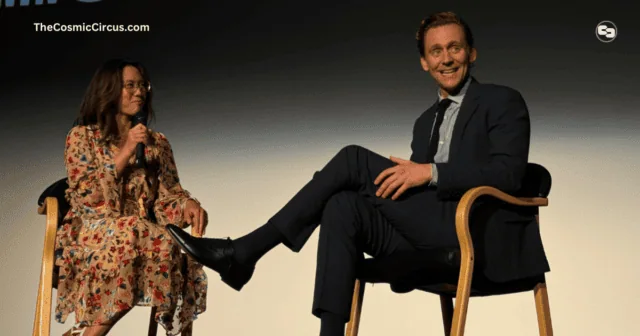
Hiddleston was clearly impressed. “Firstly, thank you so much. You’ve clearly done an enormous amount of research. It’s a huge compliment. This is the truth. At the end of the filming of season 1, […] Kevin Wright, our absolutely extraordinary producer of both seasons, came up to me in a tea break with Eric Martin, who had been on the writing staff of season 1. He said to me, ‘Okay, I think this is the end of the first chapter. What’s season 2 about?’ I just quoted a passage from ‘Four Quartets’, which is a poem I love. It’s one of those right towards the end. ‘We shall not cease from exploration. And the end of all our exploring will be to arrive where we started. And know the place for the first time.’ I can’t explain where it came from. Basically, Eliot expressed, far more eloquently and articulately than I could, where I wanted to go, which was – we had broken this character down. We’d cracked his psyche open with existential doubt and crisis. But the journey wasn’t over. And I thought, ‘How do we bring it full circle?’ That’s why that line, ‘to arrive at where we started and know the place for the first time,’ became a kind of North Star. It generated conversation between all of us, like, ‘What does that mean, to go back to the beginning?’ Where did we start? We started with a young boy who was a prince who was told only one of you can ascend to the throne, but you are both born to be kings. And is the ending a throne, but a throne that comes in a shape you would never recognize? And with a burden he would never have understood? And then going back to glorious purpose, that sort of immortal line he utters in Avengers: ‘I am Loki of Asgard. I am burdened with glorious purpose.’ ‘To arrive at where we started and know the place for the first time,’ as Mobius says, sometimes purpose is more burden than glory.”
“I started reading ‘Four Quartets’. The poem itself is such [an] extraordinary work of literature and art, is very abstract, and I think is about Elliot making sense in the wake of all that loss of life, of grief and rebirth, and time and memory, and how time perhaps isn’t linear. It’s much more complex. I opened the first page of ‘Four Quartets’. I think the very first line is ‘time present and time past, both perhaps present in time future, and time future contained in time past.’ I gave a copy to Eric Martin. Two months later, he presented me with the first episode, and Loki was time slipping from time present into time past and into time future. I gave it to Eric and said, ‘I don’t know if this will help you. I hope it does. Take a line and let it inspire you.’ There’s a beautiful passage in the latter part of the last quartet, which runs something like this. ‘And what you thought you came for is only a shell. A husk of meaning from which the purpose breaks only when it is fulfilled. Either you had no purpose or the purpose is beyond the end you figured, and is altered in fulfillment.’ And I looked at that and said, ‘That’s Loki.’ So yes, occasionally I would quote T.S. Eliot on the set.”
Tom Hiddleston on Loki’s connection to other characters
Next, the moderator brought things back around to Tom Hiddleston’s other roles. “You’ve done Othello and Hamlet and my favorite revival, [Harold] Pinter’s Betrayal on Broadway. I wonder, with the isolation and the lack of connection that Loki initially feels, how much of an emotional thread do you feel between Loki and some of the other characters you’ve played?”
Tom Hiddleston responded, “That’s such an interesting question. One of the things I found most fascinating, endlessly fascinating, every time I’ve played Loki, is the tension between his exterior and his interior life. That there is a presentation often of a very playful, very charming, very controlled, collected, witty, strategic, mischievous character, but behind the mask of the playfulness and the mischief is something much more turbulent, much more chaotic and much more uncertain. That there is a vulnerability and [an] emotional fragmentation, and a desire for connection that gets distorted on the way. It’s in his heart, that’s where he lives. But somehow it never finds its way out, except in certain moments when a dramatic event breaks the mask, and you see his truth. And I’ve always found that tension fascinating, between what is presented on the outside and what’s going on the inside. I suppose there are some other characters I’ve played who have that tension. Actually, Robert in Betrayal is someone who suppresses his pain. And then because the pain isn’t being expressed in an open way, it gets misshapen on the way out. I loved performing that. But I also believe that all human beings are incredibly complex, we are all really complex and we contain multitudes. We have many selves inside us, and we don’t present all those selves all the time. You’re a different person at work to who you are when you’re ordering a cup of coffee, or who you are with your family or at home. So I’m trying to think of another character that’s like that, but Jonathan Pine is quite like that, The Night Manager. John le Carré called him the close observer. And as a field agent who is taking on different identities to collect information to pass on to the intelligence services, he has to dissemble and pretend and present and dissimulate. So he’s got this chameleonic quality. And you wonder if there is a center to that human being. I think there is, but I think he moves the center for himself as part of his mission.
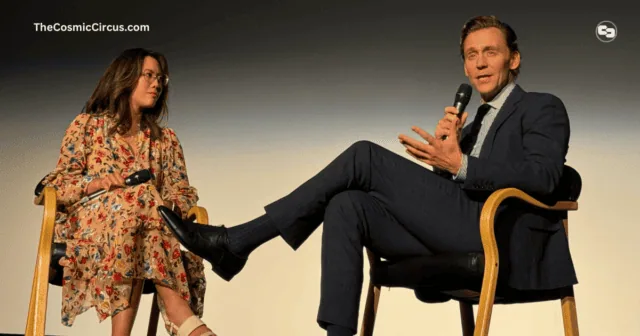
Finally, the moderator had to know what working with Owen Wilson is like, since Loki is “almost like a buddy cop comedy”. Tom Hiddleston had nothing but kind words for his co-star:
“Owen Wilson is the absolute best. And he gave so much to this. He committed himself so totally to it. I remember when we started the first season, we sat down for an afternoon because Mobius, of course, is almost a scholar of Loki. He knows Loki better than Loki does. He wanted me to take him through my journey of playing Loki, so we watched some clips, and he asked me, ‘Tom, what do you love about playing Loki?’ I think I said something like, ‘I just love that he’s got such range. If Loki is a keyboard of a piano, I get to play the light twinkly keys on top, of wit and charm and playfulness, but also get to play the heavy keys down in the left hand about grief and pain and loneliness and loss.’ And in this first scene of the first episode of the first season, he quoted that back to me as Mobius. [As] part of the interrogation he said, ‘See, I can play the heavy keys too.’ His capacity for invention is just, he’s so spontaneous and so live on set. There’s so many examples of that in the first episode of this season. When Mobius and Loki meet Ouroboros, played by the radiantly joyful Ke Huy Quan. There’s a scene where they both have this enormous challenge. But there are great risks. Loki may be disassembled at a molecular level and never reassembled again, and Mobius may have his skin peeled off. And Ke as O.B. said, ‘You both ready?’ Owen improvised as Mobius [and] he said, ‘Well hang on, hang on, hang on, I’m not sure I’m ready to have my skin peeled off.’ And then I have to say, ‘What, am I ready to be molecularly disassembled and never reassembled again? Owen said, ‘Well, actually, I’d rather have that.’ ‘What are you talking about? You get deleted from all the time forever.’ ‘Yeah, well, at least you don’t get your skin peeled off.’ And I said, ‘At least you get to live!’ And he said, ‘What’s the quality of life with no skin?’ It was just perfect Owen Wilson genius.”
“But it wasn’t just his capacity for invention. I think he really loved the philosophical nature of the relationship. Loki and Mobius talk about big ideas. And I hope the audience have found those scenes interesting. We love playing them. It is these two detectives following trails of breadcrumbs across the timeline, this unlikely pairing. Perhaps even Owen and I are kind of an unlikely pairing. But we get on so well. We have similar tastes and things. In working on the scenes, we would agree that they always work best when Mobius and Loki were passionately disagreeing with each other. That they had a different point of view about what the next step should be. We used to talk about keeping the teeth in the scene and sort of keeping it sharp. But actually, it would be fun because we were in such passionate conflict, if that makes sense. I can’t speak more highly of Owen, and I’ve loved working with him. It’s been a long journey, you know, four to five years of Owen and I. It’s so great.”
Tom Hiddleston on Loki’s evolution as a character
Hiddleston had a bit more to say about Mobius and Loki’s relationship. “It’s actually almost as if Mobius has been kind of a patient analyst for Loki, and he’s done some personal growth, and now Loki can return the favor and say, ‘It’s okay. Sometimes our emotions get the better of us. We all make mistakes. I once tried to take over New York City with an alien army. It’s a bad day at the office.’ It is fun. We always try to remember that the show is called Loki, and therefore the whole world that we created, we wanted to infuse with that playfulness and whimsy. I feel like that’s who the character has always been in our human consciousness. He’s represented playfulness. He’s the trickster, he’s the boundary crosser. He’s disruptive, he’s spontaneous, he’s mercurial, he’s unexpected. He’s unconventional. We wanted every character in the show to have those qualities, that they were all a little bit good and a little bit bad. The TVA was uncertain and full of doubt. Little bit good, little bit bad. It’s been the most fulfilling sandbox to play in for so long.”
It’s been thrilling to watch Loki’s journey through the MCU over the last decade-plus of stories on film and television. As someone who didn’t connect with the character in Loki season 1, I adore where he went in season 2 and his perfect ending. It was amazing to see Tom Hiddleston break down his character development in person!
Finally, thank you to The Ankler and Backstage for hosting this event. I’d like to give a special shoutout to London Sanders, Head of Sales at The Ankler. She’s incredibly kind and made our evening an unforgettable experience. Thank you for hosting a great event!
Book Review: Marvel: What If…Loki Was Worthy? by Madeleine Roux

